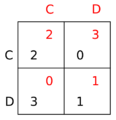Template:Selected anniversaries/June 2: Difference between revisions
Jump to navigation
Jump to search
No edit summary |
No edit summary |
||
| Line 1: | Line 1: | ||
<gallery> | <gallery> | ||
||1743 – Alessandro Cagliostro, Italian occultist and explorer (d. 1795) | |||
||1785 – Jean Paul de Gua de Malves, French mathematician and academic (b. 1713) | |||
File:Guglielmo Marconi.jpg|link=Guglielmo Marconi (nonfiction)|1896: [[Guglielmo Marconi (nonfiction)|Guglielmo Marconi]] applies for a patent for his wireless telegraph. | File:Guglielmo Marconi.jpg|link=Guglielmo Marconi (nonfiction)|1896: [[Guglielmo Marconi (nonfiction)|Guglielmo Marconi]] applies for a patent for his wireless telegraph. | ||
File:Prisoner's dilemma matrix.svg|link=Game theory (nonfiction)|1922: [[Game theory (nonfiction)|Game theory]] experts predict that [[Lloyd Shapley (nonfiction)|Lloyd Shapley]] will be born "within two years at the most." | File:Prisoner's dilemma matrix.svg|link=Game theory (nonfiction)|1922: [[Game theory (nonfiction)|Game theory]] experts predict that [[Lloyd Shapley (nonfiction)|Lloyd Shapley]] will be born "within two years at the most." | ||
||Clair Cameron Patterson (June 2, 1922 – December 5, 1995) was an American geochemist. | |||
File:Lloyd Shapley (1980).jpg|link=Lloyd Shapley (nonfiction)|1923: Mathematician and economist [[Lloyd Shapley (nonfiction)|Lloyd Shapley]] born. He will define game theory as "a mathematical study of conflict and cooperation." | File:Lloyd Shapley (1980).jpg|link=Lloyd Shapley (nonfiction)|1923: Mathematician and economist [[Lloyd Shapley (nonfiction)|Lloyd Shapley]] born. He will define game theory as "a mathematical study of conflict and cooperation." | ||
||1948 – Viktor Brack, German physician (b. 1904) T4 | |||
||1948 – Karl Brandt, German SS officer (b. 1904) T4 | |||
||1948 – Karl Gebhardt, German physician (b. 1897) | |||
||1948 – Waldemar Hoven, German physician (b. 1903) | |||
||1948 – Wolfram Sievers, German SS officer (b. 1905) | |||
||1966 – Surveyor program: Surveyor 1 lands in Oceanus Procellarum on the Moon, becoming the first U.S. spacecraft to soft-land on another world. | |||
||1967 – Sgt. Pepper's Lonely Hearts Club Band by The Beatles is released in the United States. | |||
||2000 – Gerald James Whitrow, English mathematician, cosmologist, and historian (b. 1912) | |||
||2003 – Europe launches its first voyage to another planet, Mars. The European Space Agency's Mars Express probe launches from the Baikonur space center in Kazakhstan. | |||
File:Alexander Shulgin 2009.jpg|link=Alexander Shulgin (nonfiction)|2014: Pharmacologist and chemist [[Alexander Shulgin (nonfiction)|Alexander Shulgin]] dies. He discovered, synthesized, and personal bioassayed over 230 psychoactive compounds for their psychedelic and entactogenic potential. | File:Alexander Shulgin 2009.jpg|link=Alexander Shulgin (nonfiction)|2014: Pharmacologist and chemist [[Alexander Shulgin (nonfiction)|Alexander Shulgin]] dies. He discovered, synthesized, and personal bioassayed over 230 psychoactive compounds for their psychedelic and entactogenic potential. | ||
||2015 – Irwin Rose, American biologist and academic, Nobel Prize laureate (b. 1926) | |||
</gallery> | </gallery> | ||
Revision as of 09:38, 29 October 2017
1896: Guglielmo Marconi applies for a patent for his wireless telegraph.
1922: Game theory experts predict that Lloyd Shapley will be born "within two years at the most."
1923: Mathematician and economist Lloyd Shapley born. He will define game theory as "a mathematical study of conflict and cooperation."
2014: Pharmacologist and chemist Alexander Shulgin dies. He discovered, synthesized, and personal bioassayed over 230 psychoactive compounds for their psychedelic and entactogenic potential.



